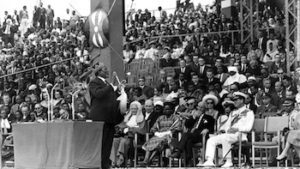
Jomo Kenyatta speaking
On this date in 1964, Jomo Kenyatta was elected the first minister of the newly independent Kenya. This occurred almost 80 years after the European invasion and the Berlin Conference.
As an independent country, Kenya was initially a constitutional monarchy, with the British monarch as its nominal head of state and a prime minister as head of the government. Although the British hoped to hand over power to moderates, when Kenya became independent, the Kenya African National Union (KANU) of Jomo Kenyatta formed a government shortly before Kenya became independent in December 1963.
In December 1964, however, Kenya became a republic with a president as both head of state and head of government. Kenyatta was chosen as the country’s first president. Kenyatta died in 1978, and Daniel Arap Moi became president. Moi was unopposed in 1979, 1983 (snap elections), and 1988, all held under the single-party constitutional rule. He took the Swahili word nyayo (meaning "footsteps") as his leadership motto to assure Kenyans that he was following the legacy of Kenyatta.
At first, Moi adopted a populist approach, releasing political prisoners, moving to limit Kikuyu's political and economic influence, and traveling among the nation’s people. In the 1980s, however, Kenya’s economic growth began to slow, and Moi’s rule became increasingly authoritarian. In 1982, the Moi government altered the constitution to make Kenya a one-party state. That year, Moi survived a coup attempt by air force personnel.
Beginning in the 1980s, Kenya experienced several debilitating droughts, and the price of coffee dropped several times. These factors damaged the Kenyan economy; the nation fell into debt, and unemployment rose dramatically. Fueled by economic discontent, intense pressure for reform of the political system and an end to Moi’s rule emerged from many sectors of Kenyan society by the end of the 1980s. Moi resisted the calls for reform, but his government was pressured by foreign economic donors, such as the World Bank and the United States, to implement political and economic reforms. Moi finally bowed to domestic and international pressures in December 1991 and agreed to legalize other political parties.
Multi-party legislative and presidential elections were held in December 1992, but the opposition was split along ethnic lines, and Moi was reelected. Continuing economic difficulties and calls for further reform marked Moi’s reputation. His administration was also accused of corruption and overspending, mainly because it favored development projects in Kalenjin-dominated areas that supported him.
Before the 1997 elections, opposition parties held demonstrations calling for electoral reform, and further ethnic clashes occurred. In late 1997, Moi consented to the repeal of repressive anti-opposition laws that had existed since colonial times. However, opposition to Moi’s rule remained divided, and he was reelected president.
In 2002, Moi was constitutionally barred from running, and Mwai Kǐbakǐ, running for the opposition coalition "National Rainbow Coalition" — NARC, was elected president. The elections, judged free and fair by local and international observers, marked a turning point in Kenya's democratic evolution.
The Encyclopedia Britannica, Fifteenth Edition.
Copyright 1996 Encyclopedia Britannica Inc.
ISBN 0-85229-633-0